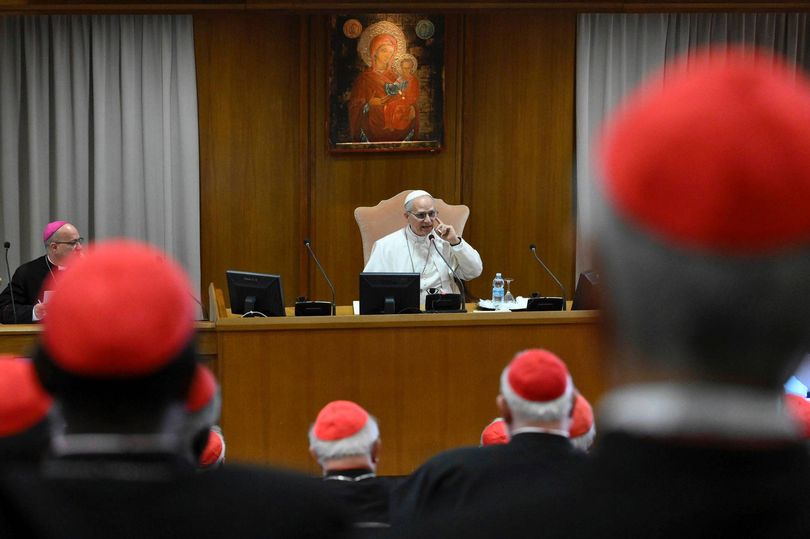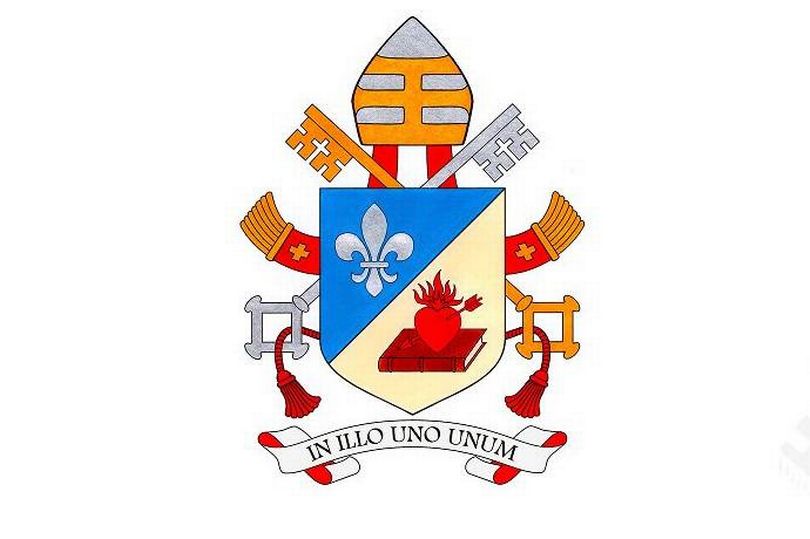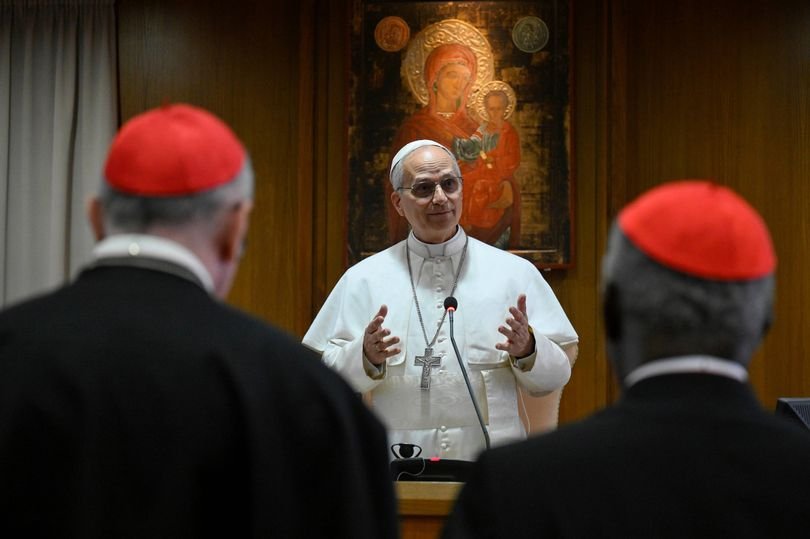Pope Leo XIV
stated his pontifical outlook on Saturday
, highlighting artificial intelligence as one of the most pressing issues facing mankind and
committing to continuing several of Pope Francis’ main focuses.
However, to explicitly show that he was
leaving his imprint on the papacy
, Leo set out on his inaugural trip since taking office, traveling to a sanctuary honoring the Virgin Mary situated south of Rome. This location bears particular importance for both his Augustinian order and his namesake, Pope Leo XIII.
As Leo reached Genazzano, he was met by the townspeople gathered around the central plaza outside the principal church. Inside this church lies the sanctuary dedicated to the Madonna del Buon Consiglio (Our Lady of Good Council). The sanctuary, managed by Augustinian friars, has been attracting pilgrims since the 1400s.
READ MORE:
Donald Trump labeled as ‘stupid’ following his ‘blatant mistake’ in address to newly elected Pope.
Pope Leo IX had raised it to a minor basilica and enlarged the nearby convent during the beginning of the 20th century.
Following his prayer session at the church, Leo spoke to the community members, emphasizing that having the Madonna among them was both an honor and a duty. Afterward, he granted a benediction before heading back to his vehicle, which was a black Volkswagen.
Upon his return to the Vatican, he stopped to pray at Francis’ grave at St. Mary Major Basilica.
Following his initial official meeting with the cardinals who chose him, Pope Leo spent the latter part of his day taking a post-lunch drive. Throughout the gathering, he often alluded to his predecessor, Francis, and highlighted the mission statement from 2013, stressing a dedication to fostering a more welcoming Catholic Church that prioritizes caring for the “marginalized and neglected.”
As America’s inaugural pontiff, Leo affirmed his commitment to the reforms set forth by the Second Vatican Council during the 1960s aimed at bringing the Church into line with contemporary times. He emphasized artificial intelligence as a crucial modern issue, underscoring its impact on human worth, fairness, and employment.
The Vatican also disclosed expectations for Pope Leo’s time in office, mentioning that he will retain his episcopal slogan and coat of arms from Chiclayo, Peru. This highlights the significance of cohesion within the church.
His slogan, “In Illo uno unum,” taken from St. Augustine, expresses that despite their large numbers, Christians are unified through Christ. His heraldic shield features the emblem of the Augustinian Order—a flaming, wounded heart along with a book representing holy scriptures.
The Vatican provided additional information regarding Pope Leo’s pectoral cross. This cross was presented to him by the Augustinian order when he became a cardinal in 2023. It contains relics of both Saint Augustine and his mother, Saint Monica, whose influence was crucial in Augustine’s transition to Christianity.
St. Augustine of Hippo stands out as a significant presence in the formative stages of Christian theology and devotion. Founded during the 13th century, the Augustinian Order consists of communities of mendicant friars dedicated to living in poverty, providing services, and spreading the gospel.
Leo attributed his name selection to AI, highlighting how his namesake, Pope Leo XIII, who was pope from 1878 to 1903, established the foundation for modern Catholic social teachings. This was particularly evident through his 1891 encyclical titled “Rerum Novarum,” where he addressed issues related to workers’ rights and capitalism during the early stages of the industrial era.
The deceased Pope condemned unrestrained capitalism as well as state-centered socialism, establishing a distinctively Catholic perspective on economic teachings.
During his remarks on Saturday, Leo mentioned that he experienced a sense of continuity with the person who previously held his position.
“In our own time, the church offers everyone the wealth of its social teaching in response to another industrial revolution and to advancements in artificial intelligence that present new challenges for the protection of human dignity, justice, and labor,” he stated.
As his leadership neared its end, Francis grew more vocal about the risks AI presents to humankind and pushed for an international agreement to regulate it.
Francis held the Chicago-native Augustinian missionary Robert Prevost in high esteem as a likely candidate for succession. In 2014, he assigned him to oversee a small diocese in Peru, wherePrevost eventually became a bishop and took charge of the Peruvian episcopal conference.
In 2023,Prevostwas later called toRometo overseeoneoftheVatican’smostimportantoffices, taskedwithevaluatingnominationsofbishops.
During his speech, which was presented in Italian at the Vatican’s synod hall rather than the Apostolic Palace, Leo often referenced Francis and conveyed deep regret about his death. He adopted Francis’ 2013 mission statement, “The Joy of the Gospel,” as a cornerstone for his guidance.
Leo highlighted Francis’ emphasis on the Church’s mission-centric nature and advocated for a more collaborative style of governance. He underscored the significance of heeding the faithful’s input, particularly in genuine and inclusive ways, such as through popular devotion.
As Leo highlighted, referring back to Francis’ 2013 mission statement, the Church must demonstrate “compassionate concern for those who are marginalized and disregarded” and engage in courageous conversations with contemporary society.
He was met with a standing ovation and stuck closely to his script, only occasionally glancing up. Even during his initial appearance on Thursday night, Leo relied on a handwritten text in Italian, presumably prepared before or shortly after his momentous election.
His most genuine moments occurred when he spoke spontaneously in Spanish.

Prevost was elected as the 267th pope on Thursday, achieving consensus on the fourth ballot of the conclave—a remarkably quick choice given it was the biggest and most widely dispersed assembly ever held.
On Saturday, Madagascar Cardinal Désiré Tsarahazana informed reporters that Prevost received more than 100 out of the total 133 votes cast in the last round of voting. This significant win surpassed the necessary two-thirds majority threshold, which stands at 89 votes.
Cardinal Pietro Parolin, the Vatican Secretary of State and among the leading candidates for the papacy, sent his greetings on Saturday via a letter published in Il Giornale di Vicenza, his hometown paper.

Parolin praised Leo for his sharp understanding of contemporary matters, recalling his earlier comments from the loggia regarding the importance of a peace that is both “disarmingly gentle and disarmament-focused.”
He praised Prevost’s skilled handling of affairs in Chiclayo, highlighting his ability to address a complex problem without providing specifics. This led to increased regard for his leadership within the Vatican, where he supervised the bishops’ office. Parolin specifically mentioned Leo’s understanding of people and situations, describing him as someone who exhibits “composure when arguing, fairness in suggesting resolutions, and shows respect, concern, and affection towards all.”
